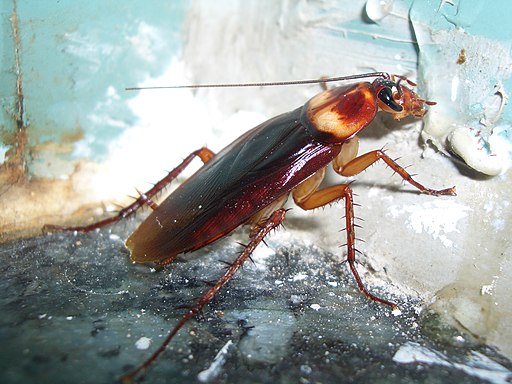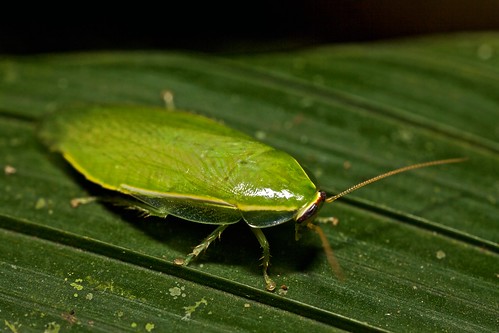Showing posts with label cockroaches. Show all posts
Showing posts with label cockroaches. Show all posts
Monday, January 3, 2011
What is a cockroach?
This is a cockroach, order Blattodea. Insects in the order Blattodea (or Blattaria if you're old-school - either way it's a roach) are characterized by long, slender cursorial (running) legs with which they achieve impressive speeds. The top of their first thoracic segment (aka the pronotum) extends up to cover their heads as a shield-shaped hat. Their mouths contain a pair of plain, sensible mandibles for chewing, their 30+ segmented antennae are thin and sensitive, ranging far ahead of their body to warn of impending danger as they run. In those cockroaches that have wings, the first pair is thickened, leathery (they're called tegmina), protecting the hind pair that is thin and membranous.
Many cockroaches are earth-toned: dull brown, tan, red, and black. A few, like the beautiful cuban cockroach (Panchlora nivea) pictured above, have striking coloration.
One thing a cockroach is not, however, is fancy. You will never find them trying to stand out with flashy patterns. They are meant to blend in with the background. Flat bodies, shielded heads, leathery forewings, the body of a cockroach is made for sneaking into small hiding places and for furtive avoidance of malicious predators. Their beauty is a functional one.
Labels:
antennae,
beauty,
blattaria,
cockroaches,
coloration,
form,
function,
insect legs
Sunday, January 2, 2011
Confessions of a Cockroach lover

MMMHHhh tasty water!
I have a confession to make. I am not afraid of cockroaches. I know, I should be. They carry diseases, they cause allergies, they're icky and run too fast. All of which, in any normal human being, should be cause for alarm.
But I just can't do it.
Why? Because they're just doing their jobs - fulfilling their cockroachy calling. Allow me to explain.
Living things are messy. It's true. We secrete and excrete and shed everywhere. When we eat, we always leave crumbs and sticky smears behind. Then we go and die and leave our messy bodies behind. Someone has to pick up the trash. A lot of times, that someone is an insect. Dung beetles specialize on picking up our crap. Ants will happily take our crumbs and lick up our sticky residues. Flies specialize on cleaning up our dead flesh after we've left this world. Cockroaches aren't really specialists. They are the garbage-men. You put it out, they pick it up.
We humans have taken messy up to a whole another level. We have made certain choices to live certain ways that create a lot of garbage. This garbage is typically a mixture of components, bits of organic matter hidden in pockets of inorganic containers and structures. The inorganic stuff is pretty useless to the rest of the living world (not entirely useless, but requiring a great deal of time and energy to return to a useful state) but the organic stuff someone can always use for food. But then who's going to go and extract it? What garbage-man would come into your house and take away all your crumbs from under the fridge? Lick our your yogurt containers, scarf up the stale cookies in your pantry, and clean the slime that clings to the inside of the drainplug in your tub? Cockroaches, that's who. They're the most effective garbage-men ever.
Their all-encompassing garbage-picking skills is what makes cockroaches susceptible to contamination by various nasty microbes. These valiant trash-men don't mind exploring your toilet brush and then your kitchen counters for delicious morsels. 'Clean dish' and 'dirty dish' is not a distinction that they know how to make. So the problem with cockroaches isn't so much the roaches themselves, but the microbes they accidentally pick up when they're on clean-up duty.
Funny thing about those microbes, though- they were already hanging around. In most cases, they were as close as your bathroom floor and your sink. The cockroaches just moved them around. Cross contamination: it's the worst kind of cooties.
So how do you keep the cockroach garbage-men on the curb? Keep your trash there too. Clean up after yourself, and the cockroaches won't have to come and do it for you.
Labels:
blattaria,
cockroaches,
disease,
entomophilia,
entomophobia,
garbage-men,
prejudice,
waste
Saturday, October 16, 2010
Roach reflexes
I've told you about the spectacle that is the Great Insect Fair Cockroach Races. Roaches are impressive runners. Apparently the fastest roach ever recorded sprinted at an amazing 3.4 miles per hour, which, when you're only 2 inches long, is lickety-split.
Perhaps you have had the surreal experience of being sure that you have stamped on an offending cockroach, only to find that he has Houdini'd his way out from under your shoe and is now across the room and disappearing under your fridge. How is it- you ask yourself- that roach-kind has invented teleportation?
Roaches, it turns out, have mastered the art of escape not with magic, but with fast reflexes.
Cockroaches are characterized by the presence of two appendages called cerci (SIR-see, singular cercus) on their last abdominal segment (read: butt). In many species, the cerci are covered with delicate sensory hairs for chemoreception or mechanoreception and act kind of like antennae for the rear end of the insect. The cerci of cockroaches are exceptionally sensitive. They are sensitive enough to pick up the tiny air currents created by your foot sweeping toward them threateningly. The sensitive cerci send a signal up the ventral nerve chord directly to the nerve center of the thorax controlling the roach's legs. Only three neurons stand between the cerci and the legs. Accordingly, the roach can react in less than 70 milliseconds. A blink of an eye is 300-400 milliseconds.
It is grace, is it not, that God gives cockroaches this kind of speed? They are universally hated and feared, constantly persecuted by stomping feet or chemical warfare. But at least the cockroach has been given the reflexes to escape from impending doom with near-clairvoyant speed.
Perhaps you have had the surreal experience of being sure that you have stamped on an offending cockroach, only to find that he has Houdini'd his way out from under your shoe and is now across the room and disappearing under your fridge. How is it- you ask yourself- that roach-kind has invented teleportation?
Roaches, it turns out, have mastered the art of escape not with magic, but with fast reflexes.
Cockroaches are characterized by the presence of two appendages called cerci (SIR-see, singular cercus) on their last abdominal segment (read: butt). In many species, the cerci are covered with delicate sensory hairs for chemoreception or mechanoreception and act kind of like antennae for the rear end of the insect. The cerci of cockroaches are exceptionally sensitive. They are sensitive enough to pick up the tiny air currents created by your foot sweeping toward them threateningly. The sensitive cerci send a signal up the ventral nerve chord directly to the nerve center of the thorax controlling the roach's legs. Only three neurons stand between the cerci and the legs. Accordingly, the roach can react in less than 70 milliseconds. A blink of an eye is 300-400 milliseconds.
It is grace, is it not, that God gives cockroaches this kind of speed? They are universally hated and feared, constantly persecuted by stomping feet or chemical warfare. But at least the cockroach has been given the reflexes to escape from impending doom with near-clairvoyant speed.
Wednesday, October 6, 2010
Cockroach races
The Great Insect Fair was last weekend. As I do every year, I stood at the starting gate of the cockroach races and prayed that the cockroaches wouldn't escape as small children, their hands barely grasping the roach tubs, tried to pour their cockroaches into pvc-pipe tracks. Cockroaches, being non-liquid, typically do not pour well. And if you take your eyes off of them for a second, they will happily scurry out of the container and onto the child, causing shrieks and severe trauma. Then I would set out running after the fugitive, who, realizing I was behind him, would tuck himself under some child's foot or run between some mother's legs, sending a ripple of excitement out from the cockroach racing table. Executing a graceful volleyball dive, I would smack my hand on the cockroach's greasy forewings and pinch up the cockroach with a ferocity that startled cockroach-lovers. Captured again, the cockroaches looked sullen, but unharmed.
When mindful children and volunteers managed to dump the cockroaches into the race-track successfully, roach performance was mixed at best. At times the roaches performed like trained greyhounds, streaking through the pvc tunnel in 2 seconds or less. Other times, the roaches found the tunnel an ideal space for grooming or contemplation. As you might expect, they all run pretty fast when they get a whiff of freedom.
The cockroach races have a profound effect on the psyche of observers. People who would find themselves standing on a chair if a cockroach walked across their kitchen floor are picking their favorites to win, cheering like they had money riding on it. They feel kinship with the roach, like it is their own pet. Perhaps there is something delightful about watching any animal run. But as soon as the roach is running outside of the track, people instantaneously revert to their natural human hate reflex and cannot understand why people like me are willing to touch roaches with my bare hands.
By the end of the day my hands smell strongly of cockroaches, my voice is hoarse, and my feet are sore from standing. I go home and take a long shower and breathe in deeply the lack of anxiety as I throw my own cockroaches a few bits of fruit.
When mindful children and volunteers managed to dump the cockroaches into the race-track successfully, roach performance was mixed at best. At times the roaches performed like trained greyhounds, streaking through the pvc tunnel in 2 seconds or less. Other times, the roaches found the tunnel an ideal space for grooming or contemplation. As you might expect, they all run pretty fast when they get a whiff of freedom.
The cockroach races have a profound effect on the psyche of observers. People who would find themselves standing on a chair if a cockroach walked across their kitchen floor are picking their favorites to win, cheering like they had money riding on it. They feel kinship with the roach, like it is their own pet. Perhaps there is something delightful about watching any animal run. But as soon as the roach is running outside of the track, people instantaneously revert to their natural human hate reflex and cannot understand why people like me are willing to touch roaches with my bare hands.
By the end of the day my hands smell strongly of cockroaches, my voice is hoarse, and my feet are sore from standing. I go home and take a long shower and breathe in deeply the lack of anxiety as I throw my own cockroaches a few bits of fruit.
Subscribe to:
Posts (Atom)
